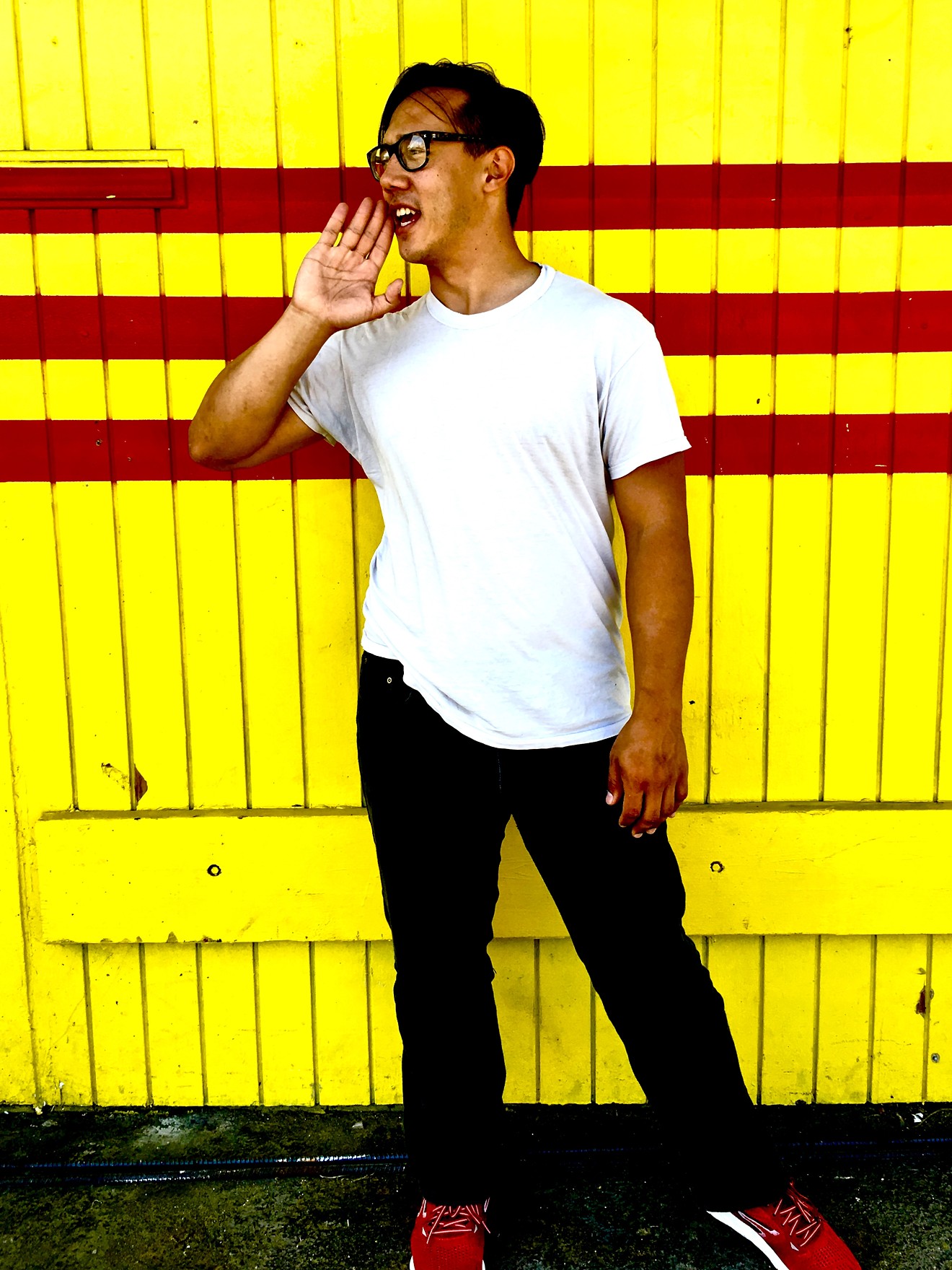As an Asian-American kid growing up in Nashville, Julian Saporiti struggled to find connections to people who looked like him, who shared his origin story. The son of a Vietnamese immigrant who fled the war-torn country in its final days of U.S. occupation, his worldview was shaped by the stories he heard and the anecdotes he read, stories of the tribulations, but also triumphs, of other Asian Americans.
In the course of his research as a graduate student studying the WWII-era internment of Japanese Americans, Saporiti came across an image that changed his view of himself and his place within the history of immigrant culture.
“It really started with a photograph,” says Saporiti, a musician who fronted the indie-rock band Young Republic and who now plays under the name No-No Boy. “There was a camp at Heart Mountain in Wyoming, right outside Yellowstone. When I was living in the West, as a grad student in Wyoming, I kind of made a pilgrimage up there to the museum, and I saw this little picture, in the middle of this much larger exhibit, about a jazz band that formed at Heart Mountain, [standing] behind the barbed wire and stuff. And that got me hooked: Who are these people?"
Even though he’d studied music as an undergrad and traveled the country as a working musician, Saporiti says he was completely ignorant of the musical element of this heart-wrenching part of history.
“I went to Berklee College of Music,” he says. “It’s like a jazz school, and I studied jazz, but I never studied about an Asian-American pop musician or jazz musician. So I saw this picture in, of all places, the middle of Wyoming, these Japanese-American people who formed a jazz band in a concentration camp, and that just blew my mind. From that little story, I just began talking to anyone I could who’d been in these camps.”
Another photograph also helped Saporiti identify with the people he’d been reading about in his research.
“There's this kid named Tony on Catherine Street in 1981,” says Saporiti, “and he's wearing a Ramones T-shirt, sort of like that picture of the jazz band at Heart Mountain, that was one of those times where I was like, 'Oh, shit, this is me!’ Here's this punk-rock Asian-American kid who I've never seen before, but it certainly represents me better than Jackie Chan, which is the only representation that I saw of myself growing up.”
Back home in Nashville, Saporiti says the stories and imagery he was learning about in his research started to creep into his music, and the idea for No-No Boy was born.
“At some point as a Ph.D. student, I just started writing songs,” he says. “I had my headphones on, and I was listening to oral histories and talking to my mom, sort of about her war experiences in Vietnam in the ’60s. I just started writing all these quotes into songs. Then it became more formalized, to the point where it’s a big chunk — about a third or half — of my dissertation.”
No-No Boy gets its name from the Japanese Americans who were ordered to live in internment camps during World War II, soon after the Pearl Harbor attack in 1942. Despite being held against their will, the captive citizens were asked to serve in combat and swear allegiance to the United States. Those who answered “no” to those two demands on the government’s "Loyalty Questionnaire" became “No-No Boys.”
Saporiti, with the help of musical cohort Emilia Halvorson, will be at the University of Colorado Boulder this week for a short residency that culminates in a live musical performance by No-No Boy. He says his concerts are a fun but gripping way for people of all walks of life to digest dense historical information.
“It’s kind of a project of hidden histories using songs,” he says. “The concert is very heavy on visuals, like bringing my archival research onto a projected screen and sort of synching the songs up with that, to sort of just give people, whether they’re students or whether I’m doing a regular concert, folk, indie-rock gig, a little more attachment, empathy through art.”
The material isn’t just stuffy history. It ties in perfectly, he says, to the current political and social situation in which America finds itself.
“I was...looking at all these hidden histories around the West, like the Chinese massacre in Rock Springs [Wyoming], visiting actual internment camps, talking to my family about refugees in refugee camps,” says Saporiti, “and just sort of finding, through these disconnected histories, these kinds of parallels not only to each other, but to what’s happening today with all the immigration bans.”
Despite the heaviness of the material he covers, Saporiti says his primary concern is always the music. It just so happens that his other love — history — meshes seamlessly with his songs.
“I’ve been lucky because I use music to reach a lot more people than I would with a normal dissertation, which three people might read,” says Saporiti. “I think by choosing to use songs over more argumentative forms of sharing my research…it gets people off edge. I’m just singing you songs and showing you pictures, and maybe we can talk about it afterward. I feel like writing songs and just kind of sitting with people; it’s just a real campfire methodology. You’re just chilling and some dude’s playing guitar and singing. I think maybe it’s an easier way for some people to talk across party lines or just be less riled up.”
Saporiti is quick to stress his own impartiality in the process. He has a strong opinion about the material, obviously, but he’s not willing to force-feed it to his audience. Instead, he says, he throws a lot of information against the proverbial wall and hopes something sticks.
“I’m not making an argument,” he says. “That’s why I choose to do a concert instead of lecture. You can come with no knowledge, and if you see some picture that sticks in your brain or you hear some lyric that you turn over as you drive home, or you buy a [record] or go listen on Spotify, if something seeps in, that’s the point. That’s always the heart of it — just to sing songs that people like, regardless of what the content is. Hopefully if there’s a melody that gets stuck in your head, then you kind of go back and think about what you were hearing.”
No-No Boy plays Grusin Hall on the CU Boulder campus, Friday, October 11, at 7:30 p.m. The show is free to students and the general public.
[
{
"name": "Air - MediumRectangle - Inline Content - Mobile Display Size",
"component": "12017618",
"insertPoint": "2",
"requiredCountToDisplay": "2"
},{
"name": "Editor Picks",
"component": "17242653",
"insertPoint": "4",
"requiredCountToDisplay": "1"
},{
"name": "Inline Links",
"component": "18838239",
"insertPoint": "8th",
"startingPoint": 8,
"requiredCountToDisplay": "7",
"maxInsertions": 25
},{
"name": "Air - MediumRectangle - Combo - Inline Content",
"component": "17261320",
"insertPoint": "8th",
"startingPoint": 8,
"requiredCountToDisplay": "7",
"maxInsertions": 25
},{
"name": "Inline Links",
"component": "18838239",
"insertPoint": "8th",
"startingPoint": 12,
"requiredCountToDisplay": "11",
"maxInsertions": 25
},{
"name": "Air - Leaderboard Tower - Combo - Inline Content",
"component": "17261321",
"insertPoint": "8th",
"startingPoint": 12,
"requiredCountToDisplay": "11",
"maxInsertions": 25
}
]












